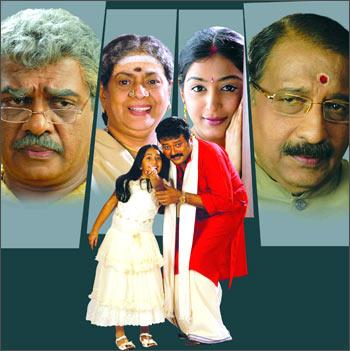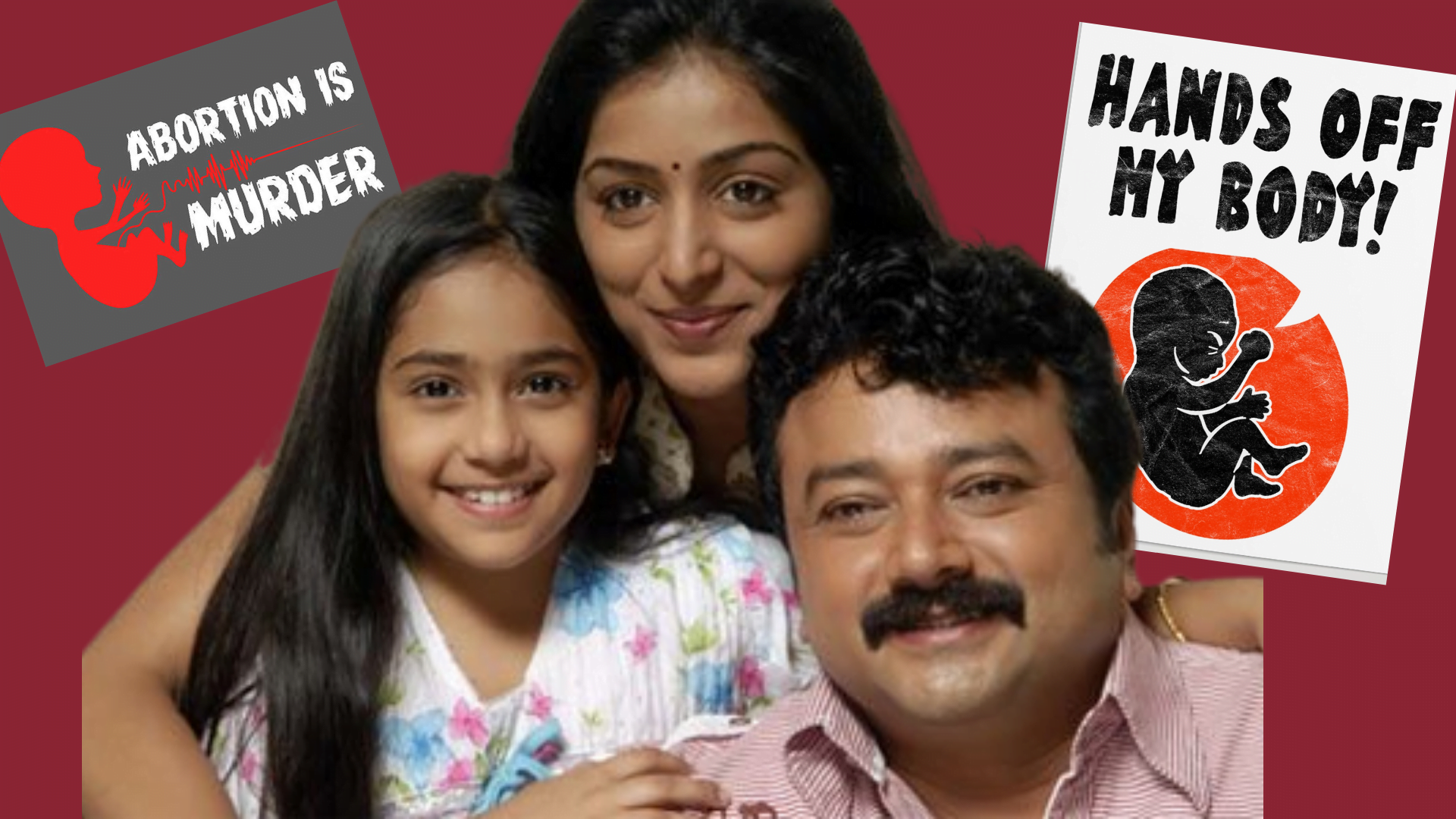The abortion discourse has various influences on the media we consume, including mass media such as movies or films. We are witness to how Malayalam cinema in the past has denied portraying abortion as a choice of women, without drama or agony as this subject potentially could upset some sections of the audience. Hence, they tend to exaggerate the terror and medical risks behind abortion, without giving importance to the real barriers like financial issues, the emotional fortitude and social support the pregnant person needs to make safe abortion possible.
Kana Kanmani (2009) directed by Akku Akbar starring Jayaram (Joy) and Padmapriya (Maya) in main roles is a Malayalam horror film that promotes pro-life ideologies. Pro-life is a belief that every human life is created equally regardless of size, level of development, education, and degree of dependency.
Kana Kanmani (2009) directed by Akku Akbar starring Jayaram (Joy) and Padmapriya (Maya) in main roles is a Malayalam horror film that promotes pro-life ideologies. Pro-life is a belief that every human life is created equally regardless of size, level of development, education, and degree of dependency. Therefore, the life of an “unborn baby” or the fetus is deemed as valuable, and abortion is seen as the violation of one’s fundamental right to life. While at its face value, this seems like an ethical understanding of life, this is often used to deny agency to pregnant persons with regards to their reproductive choices. As opposed to this, the pro-choice abortion ethos argues for autonomy over one’s body and is based on the belief that every pregnant person should have the right over their life and body. Hence, it is the pregnant person who gets to decide whether they want to continue the pregnancy or not. The main plot of the movie is based on how abortion is inhuman and morally wrong. The young couple Maya and Joy and their daughter live a happy life until they are haunted by their ‘unborn child’. The movie portrays abortion as a monstrous crime and totally disregards one’s right to autonomy over their body.
Also read: Counterfeit Kunkoo: A Powerful Commentary On Identity, Agency And Rape
Kana Kanmani approaches abortion primarily in emotional and moral terms. The plotline is more of a cautionary tale that provides a moral commentary on pregnancy and abortion. Many scenes are problematic, especially the ones that personify the fetus. For instance, the gynaecologist advises Maya to not terminate the pregnancy by explaining the terror and helplessness of the fetus. Such a scene is misleading as the advice given by the gynaecologist was unscientific and biased.
Secondly, the doctor also questions the woman’s choice over whether she wanted to continue with the pregnancy or not. In this film, the gynaecologist is hands-on ready to teach Maya and the audience about the facts and statistics of abortion in India and how it is a ‘sin’. Families of Maya and Joy were shown as unsupportive of their decision to terminate the pregnancy; instead, they celebrated the pregnancy, thus pushing the couple further into emotional turmoil. Maya feels helpless and finds herself in a position of not knowing what is right. Even though initially Maya and Joy together decided to not have a child before they are financially settled, later she regrets her decision to terminate the pregnancy. Another point to note is that, she is shown as terminating the pregnancy because her husband was not ready to welcome a child. Often, this is exactly what is expected from an ideal woman, wherein the women’s bodies and minds are considered subservient to notions of patriarchal morality and the assigned gender roles of wifehood and motherhood.

Context and genre of Kana Kanmani undeniably fabricate the idea of abortion as murder of an innocent ‘child’. The horror genre depicting abortion is used to address an intense conflicting fear around abortion. The climax scene of the movie which is believed to be the most emotional scene opens with an interaction between the fetus.
This could also be extended to comfort the abortion opponents who like to categorize women who have abortions as ‘characterless’, ‘selfish’, and ‘heartless. Context and genre of Kana Kanmani undeniably fabricate the idea of abortion as murder of an innocent ‘child’. The horror genre depicting abortion is used to address an intense conflicting fear around abortion. The climax scene of the movie which is believed to be the most emotional scene opens with an interaction between the fetus, Joy and Maya where the fetus says,
“You killed me for your happiness and selfishness even though I was in your womb…you never loved me.”
The writers of the film treat the fetus like a person who has feelings and use it as a tool to moral police anyone who undergo abortion. This emotional approach to abortion is menacing and could set a dangerous precedent for pregnant persons, thus making it difficult to exercise their reproductive rights. Kana Kanmani forgets to tell the story from the perspective of women who have had to undergone abortion. Again, this also does not come across as surprising since ours is a society where sexual rights and selfhood has been traditionally viewed as a threat to traditional social institutions and has been estimated in terms of passivity and acceptance.
Aval (2020) deals with a captivating theme of who owns the autonomy of women’s bodies and speaks about postpartum depression which continues to still be unacceptable and invisible to the society. The director, Adarsh Kumar Aniyal and the producer, Dr Veena J.S, deserves appreciation for the way they sensitively handled the storyline. A young mother Reena is helpless as she is at the receiving end of continuous violations happening to her body and mind from the emotional abuse of society and her husband. Her husband blames her contraception failure and deems her ‘characterless’. Reena then decides to not continue with the pregnancy. The reason behind Reena’s decision to terminate is the behaviour of her husband which is a common shade of patriarchy as the film shows that she was so happy at first when she heard that she was pregnant. This is one major drawback in the film since the decision of women to choose abortion can be motivated by multiple reasons; yet the film chooses to show it as one determined by a man, thus undermining the woman’s choice (again).

https://www.youtube.com/watch?v=JM5OfgXidZc
Aval reveals the tribulations a woman faces as she struggles to decide for herself and communicates how the prejudices of the society traumatize women. While Reena was approaching the gynaecologist for abortion, instead of understanding the need of the abortion seeker, the gynaecologist subjects her to sexist and repressive comments.
“…to get an abortion you have to be with someone responsible. Where is your husband? How can you take such a decision alone? You alone cannot make a baby, right?”
While the protagonist argues about her right to terminate the pregnancy, the gynaecologist takes it a notch higher and begins to character assassinate her and tries to inject prejudiced thoughts on her. This again, is also a very easy and common toxic tool to chain women’s reproductive and sexual rights. Venture of the public to make women feel guilty and sinful is often what is stopping them from exercising their reproductive rights even if our country has comparatively more liberal laws around abortion. The film also addresses how abortion is much more arduous for women who belong to underprivileged sections. Several corrupt medical institutions and doctors could exploit their lack of awareness about the legal and financial side of abortion and scare them to exhort their hard-earned money. Even abortion pills are not easily available as it can only be used with a proper prescription. Plotline of the film succinctly attempts to address all these.
Also read: How Representation In Media Shapes The Public Opinion On Abortion
“You should know this will happen before you widen your legs.” — Vicious and offensive language used by the medical attenders was also showcased in Aval. The women are often rendered without any defence, are mocked and abused in many hospitals and in our society. This trauma and exploitation leads to postpartum depression because of which Reena struggles to take care of herself or the child. Our social conditioning, its structures are always positioned to ignore the problems of women. This short film does a commendable job in shining light on those issues. It emphasises on the need for sex education and various aspects of sexual violence, in addition to its commentary on right to abortion and postpartum depression.



